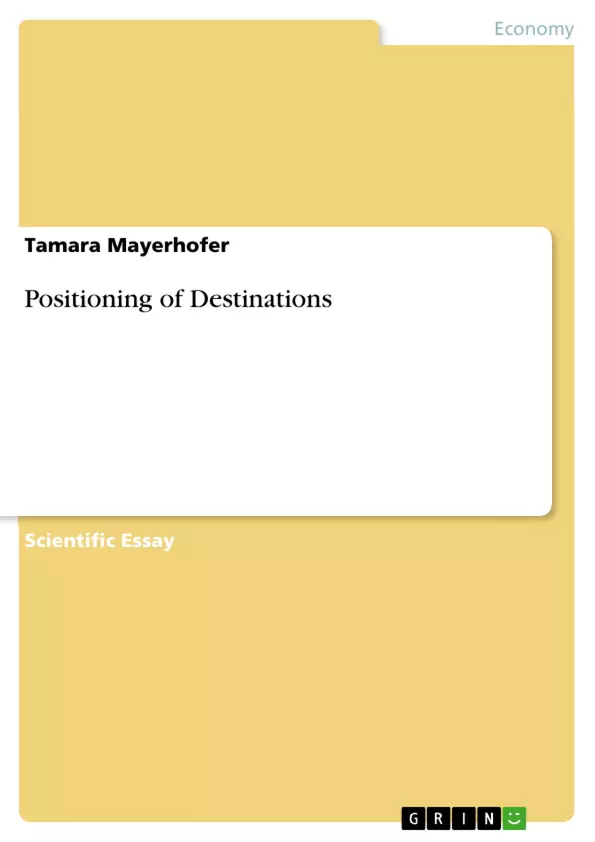This Paper focuses on the importance of strategic positioning of destinations and its stakeholders in a globalised competitive environment. The theoretical background is based on the research on destinations and destination management, strategic marketing, strategy development and positioning strategies and positioning models. A new theoretic framework from a RBV was developed to identify the most important elements of the successful positioning of destinations and its organizations from a stakeholder perspective. An empirical study was applied to all stakeholders who form a destination by the example of three very successful positioned destinations in the Austrian Alps. The theoretical model was tested by the application of frequency distribution and multiple linear regression analysis. Most of the points were confirmed but also a few rejected which asks for further research. However, the applied model gives a great insight in how stakeholders can successful and sustainable position their organizations and the destination as a whole. It further can be used as a tool to find an efficient positioning strategy for young entrepreneurs or gives helpful advice for stagnating or decreasing businesses to formulate a new positioning strategy or aim for a relaunch.
Inhaltsverzeichnis (Table of Contents)
- Destination and Destination Management Organisations (DMO)
- Strategic Marketing
- Strategy Development
- Positioning Strategies, Positioning Models
- Model for successful Positioning of Destinations from a Stakeholder Perspective
- Empirical Study
Zielsetzung und Themenschwerpunkte (Objectives and Key Themes)
This paper examines the strategic positioning of destinations in a globalized and competitive tourism industry. The research analyzes the importance of stakeholders' roles in achieving sustainable success. Drawing upon the Resource-Based View (RBV), the paper develops a theoretical framework to identify key elements for successful destination positioning. The paper further applies an empirical study to three well-positioned destinations in the Austrian Alps to test the theoretical model.
- Strategic positioning of destinations in the tourism industry
- Stakeholder involvement and collaboration in destination management
- Development of a theoretical framework for successful destination positioning based on RBV
- Empirical study testing the theoretical model using Austrian Alps destinations
- Analysis of key factors contributing to successful destination positioning
Zusammenfassung der Kapitel (Chapter Summaries)
The paper begins by defining a destination as a geographically chosen place offering amenities to satisfy visitors. It explores the importance of coordinating stakeholders in the destination's value chain to achieve sustainable success, highlighting the crucial role of a Destination Management Organization (DMO) in overcoming disagreements and promoting the destination as a product.
The paper then dives into strategic marketing, exploring both market-based and resource-based views. It emphasizes the resource-oriented marketing approach, aligning customer needs with an organization's core competencies, as a suitable strategy for sustainable destination marketing.
Strategy development is discussed next, emphasizing the importance of efficient processes for sustainable success in the dynamic tourism market. The paper explores tools and methods such as the 4Ps of the marketing mix, developing a unique selling proposition (USP), and utilizing the cluster theory.
The paper also delves into positioning strategies and models, highlighting the significance of a strong, independent, and long-term positioning strategy for achieving sustainable competitive advantage. It presents the Destination Competitiveness & Sustainability Model of Ritchie & Crouch (2005) and the Destination Competitiveness Model of Dwyer & Kim (2003) as foundational models for the Model of Positioning of Destinations from a Stakeholder perspective.
The paper then introduces the developed Model of Positioning of Destinations from a Stakeholder perspective, dividing it into six categories, each defined by several variables. The categories include Location Factors, Core Resources & Attractions, Supporting Factors & Resources, Demand Factors, Destination Management, and Positioning.
Finally, the paper details the empirical study conducted to test the theoretical framework and hypotheses. The study involved an online questionnaire distributed to stakeholders in the tourism industry across three well-positioned destinations in the Tyrolean Alps: Paznaun, Serfaus-Fiss-Ladis, and Kitzbühel.
Schlüsselwörter (Keywords)
This paper focuses on key concepts such as destination positioning, stakeholder involvement, resource-based view (RBV), destination management, destination competitiveness, tourism industry, strategic marketing, sustainable success, empirical study, and Austrian Alps.
Frequently Asked Questions
What is the importance of strategic positioning for tourist destinations?
Strategic positioning helps destinations differentiate themselves in a globalized competitive environment, ensuring sustainable success and attracting the right target groups.
What is the role of a Destination Management Organization (DMO)?
A DMO coordinates the various stakeholders in a destination's value chain, promotes the destination as a unified product, and helps overcome internal disagreements.
What is the "Resource-Based View" (RBV) in destination marketing?
RBV focuses on identifying and leveraging an organization's or destination's unique core competencies and resources to achieve a sustainable competitive advantage.
Which destinations were analyzed in the empirical study?
The study analyzed three successful Austrian destinations: Paznaun, Serfaus-Fiss-Ladis, and Kitzbühel.
What are the key categories for successful destination positioning?
The theoretical model identifies six categories: Location Factors, Core Resources & Attractions, Supporting Factors, Demand Factors, Destination Management, and Positioning.
- Citar trabajo
- Mag. Tamara Mayerhofer (Autor), 2010, Positioning of Destinations, Múnich, GRIN Verlag, https://www.grin.com/document/150789



